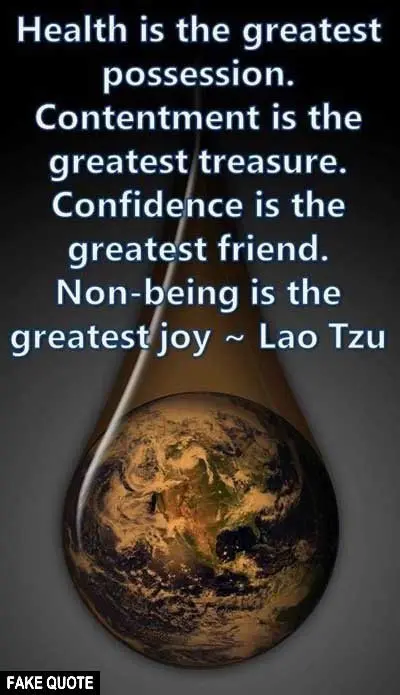|
Tao Te Ching
THE TAOISM OF LAO TZU
|
Fake Lao Tzu Quote"Health is the greatest possession..."
This is NOT a quote from Tao Te Ching:"Health is the greatest possession. Contentment is the greatest treasure. Confidence is the greatest friend. Non-being is the greatest joy."
This might pass as something Lao Tzu would have said, except for the last sentence. Not only was he rather uninterested in joy, but non-being was no ingredient in his cosmology. He did not even show the least interest in what might come after death. And the sage he spoke of in Tao Te Ching was definitely being, though far from noisy or intrusive. Well, Lao Tzu would also be at least ambiguous about confidence, if not specifically in Tao, the Way. Otherwise, he would praise humility more. And health was not something he discussed in Tao Te Ching.
Dhammapada is a collection of aphorisms on the Buddhist strife for nirvana, from around the third century BC. The earliest book I have found accrediting the quote to Lao Tzu is The 6 Sacred Stones from 2008, a novel by Matthew Reilly (page 257), using "nonbeing" instead of "nirvana." The change of that word indicates an adaption of the quote from a Buddhist origin to something less obviously so. Still, it does not make the quote Taoist. Matthew Reilly might not be the first one to claim Lao Tzu as the source of the quote. By 2008 (or 2007, when his book was first published in Australia), he could have found web pages giving him that impression. That is something I have not been able to confirm, though. The oldest Internet appearance of the quote ascribed to Lao Tzu I have found with an ascertained date is from November 2008 in the blog Financial Philosopher. It refers to two sources — D. C. Lau's version of Tao Te Ching from 1963 and The Complete Idiot's Guide to Eastern Philosophy from 2000, by Jay Stevenson — but the quote is in none of these books. The earliest Facebook posting of the quote ascribed to Lao ´Tzu is from April 2010, using the Chinese characters for his name. But both before and after that date there are also posts ascribing it to Buddha or Dhammapada, albeit with slightly different wordings. On Goodreads, the quote is also accredited to Lao Tzu, but has only four likes (August 2020), the first one from as late as 2013. So, it might be that Matthew Riley was the origin of the mistaken accreditation of this quote to Lao Tzu. But it would be strange if he made this error when using Dhammapada as his source. It is more likely that he mixed up sources when picking from some list of old quotes that I have not been able to find.
Stefan Stenudd September 14, 2020.
More Fake Lao Tzu QuotesThere are many more fake Lao Tzu quotes examined on this website. Click the header to see a list of them.
Fake interview with the authorClick the header to read a "fake" interview with Stefan Stenudd, the author of Fake Lao Tzu Quotes.
About CookiesMy Other Websites:I Ching OnlineThe 64 hexagrams of the Chinese classic I Ching and what they mean in divination. Try it online for free.
Qi Energy ExercisesThe ancient Chinese life energy qi (chi) explained, with simple instructions on how to exercise it.
Life EnergyThe many ancient and modern life force beliefs all over the world explained and compared.
Taoismen på svenska
Other Books by Stefan StenuddClick the image to see the book at Amazon (paid link).
The Greek philosophers and what they thought about cosmology, myth, and the gods. |
 Tao Te Ching
Tao Te Ching Now it's a book, too!
Now it's a book, too! Tao Quotes
Tao Quotes Cosmos of the Ancients
Cosmos of the Ancients Qi — Increase Your Life Energy
Qi — Increase Your Life Energy Aikido Principles
Aikido Principles Life Energy Encyclopedia
Life Energy Encyclopedia Archetypes of Mythology
Archetypes of Mythology Psychoanalysis of Mythology
Psychoanalysis of Mythology Stefan Stenudd
Stefan Stenudd